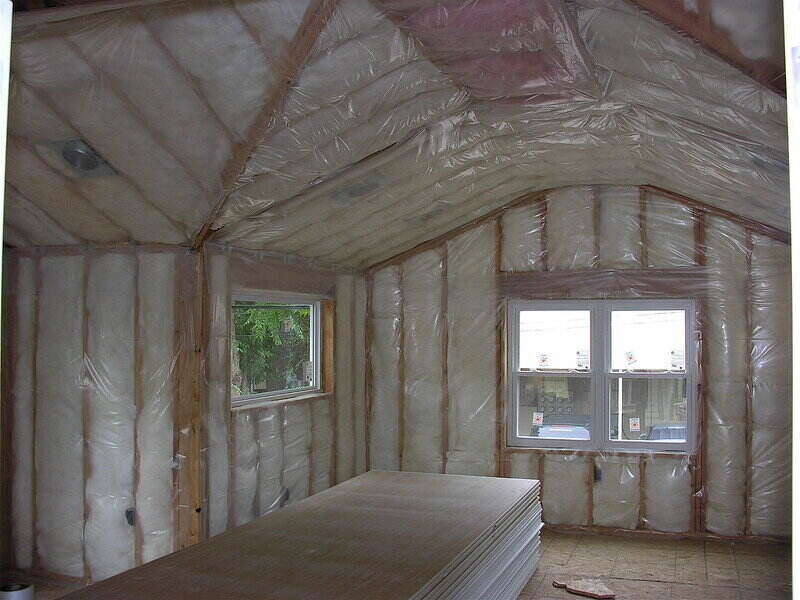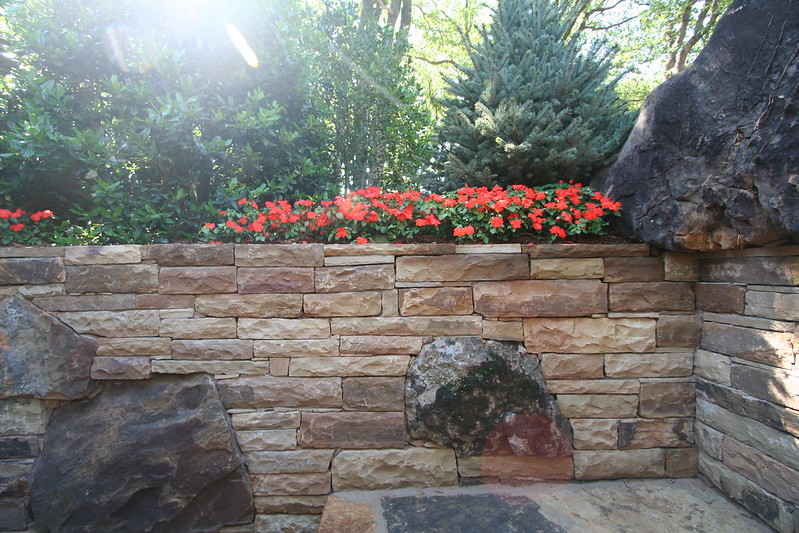Retaining walls are an attractive way to control water flow and prevent soil erosion. The national average cost to install a retaining wall is $6,300, with most Americans paying $3,500 – $9,400. However, small jobs can cost as little as $1,200, and large jobs can cost as much as $13,700.
Retaining walls control runoff water and block wind, thus reducing floods and property damage. Hence, a retaining wall is a wise investment for homeowners who live in flood zones or climates with heavy rainfall. In addition, sloped properties greatly benefit from the protection of a retaining wall.
In this cost guide:
- Average Costs
- Cost Estimator by Size
- Other Factors That Affect Cost
- Related Services
- Pro Cost vs. DIY Cost
- Cost by Location
- FAQ
Average Retaining Wall Costs in 2025
| National Average Cost | $6,300 |
| Typical Price Range | $3,500 – $9,400 |
| Extreme Low-End Cost | $1,200 |
| Extreme High-End Cost | $13,700 |
The total cost of a retaining wall depends on size, building material, land preparation, and other cost factors. If you are on a low budget, consider a small retaining wall made of vinyl to cut costs.
Retaining Wall Cost Estimator by Size
Most retaining walls cost $20 to $53 per square foot, with the average square foot cost being $33. To calculate a retaining wall’s square footage, multiply its length (in feet) by its width (in feet). Please see typical pricing by size in the table below.
| Retaining Wall Size | Typical Cost |
| 42 sq. ft. | $840 – $2,226 |
| 175 sq. ft. | $3,500 – $9,275 |
| 350 sq. ft. | $7,000 – $18,550 |
Other Factors that Affect Cost
For an accurate estimate of how much a retaining wall will cost, you must consider the following factors:
Building Material
The cost of a retaining wall depends on the materials used to build it. Please see common pricing by material in the table below.
| Building Material | Typical Cost Per Square Foot |
| Vinyl | $10 – $15 |
| Gabion | $10 – $40 |
| Wood | $13 – $35 |
| Interlocking blocks | $15 – $35 |
| Cinder blocks | $15 – $40 |
| Landscape blocks | $15 – $60 |
| Brick | $17 – $43 |
| Railroad tie | $18 – $25 |
| Aggregate | $20 – $25 |
| Rammed-earth mix | $20 – $30 |
| Poured Concrete | $20 – $40 |
| Natural Stone | $20 – $90 |
| Steel | $42 – $137 |
| Coren steel | $75 – $150 |
Not sure which wall material to use?
- Vinyl retaining walls are affordable and durable, with a typical lifespan of 50 years. Vinyl is lightweight and works best for shorter walls.
- Gabion walls are made out of wire boxes filled with rocks. They are easy to install, low-maintenance, and excellent at stabilizing soil. They typically last 10 – 75 years.
- Interlocking concrete blocks are easy to install, affordable, and visually appealing.
- Poured concrete retaining walls are the most durable, and they are also very versatile. They can last up to 100 years.
- Wood retaining walls have a rustic ambiance that many homeowners love. However, they are not the most durable and typically last 20 – 40 years.
- Railroad ties are made out of wood that has been soaked in creosote. The treatment makes the wood more durable, but the creosote is toxic.
- Rammed-earth mix combines compacted earth with a binder (e.g. cement). It is more environmentally friendly than concrete but is often just as strong.
- Stone walls typically last 40 – 100 years. There are two main ways to stack stones: Dry-stacked stones are held together with gravity, and wet-laid stones use mortar. Stones have a versatile appearance and can complement both rustic and modern landscapes.
- Corten steel is stronger and more expensive than other steel types. It can last up to 100 years.
You may want to check out practical retaining wall ideas to boost your curb appeal to help you choose a material based on looks.
Type of Wall
The type of retaining wall also affects its cost. There are five main types of retaining walls:
- Gravity walls use their weight and size to manage water flow and soil erosion. They typically cost $10 – $30 per square foot and can be made out of anything. This method works best with shorter walls.
- Anchored retaining walls (aka tie-back systems) have thin walls supported by anchors and cables. They typically cost $10 – $30 per square foot and can be made of any material. They also use gravity, but this method can be used to build taller walls than traditional gravity retaining walls.
- Cantilever retaining walls are made from steel bars and concrete and have a foundation that provides extra support. They are usually made of stones or blocks and cost $25 – $30 per square foot.
- Counterfort walls are similar to cantilevered walls, but they have multiple sections that go in different directions. They are often used around pools and landscaping and usually cost $15 – $25 per square foot.
- Sheet piling retaining walls use space-saving engineering and typically cost $10 – $50 per square foot. They are thin and usually made of steel, wood, or vinyl.
Placement
Where do you want to put your retaining wall? Retaining wall placement affects its size and the amount of force it needs to withstand, which also affects the cost. Please see typical pricing by wall placement in the table below.
| Location | Typical Cost Per Linear Foot |
| Driveway | $38 – $138 |
| Landscape | $30 – $150 |
| Shoreline | $108 – $288 |
| Swimming pool | $20 – $100 |
| Backyard | $33 – $255 |
| Front yard | $30 – $200 |
| Slope | $40 – $200 |
Land Preparation
Before building a retaining wall, land may need to be:
- Leveled: Expect to pay $0.40 – $2.00 per square foot for leveling.
- Graded: Grading typically costs at least $500.
- Excavated: Land excavation typically costs $50 to $200 per cubic yard.
- Cleared: The cost of clearing land is about $735 – $2,330 per acre. The price depends on how much forestry is on the land.
Waterproofing
The strength and durability of a retaining wall depend on the wall being waterproof. Depending on the method used, waterproofing a wall can cost $2 – $10 per square foot. All retaining walls need waterproofing, so it is automatically included in the overall project cost.
Reinforcements
Walls taller than 4 feet and concrete walls usually require reinforcements such as steel rebar or extra material in the wall’s foundation. Rebar installation typically costs $1.50 – $2.50 per square foot.
Drainage
For a retaining wall to be effective, the property needs proper drainage. The type and placement of existing drainage can impact the installation cost of a retaining wall. If you don’t have an existing drainage system, you will probably want to add one before your retaining wall contractor begins construction.
Related Services
If you’re thinking about getting a retaining wall, here are some other home improvement services that may interest you:
French Drain
French drains are an easy-to-install way to improve drainage in your lawn. They’re often used in tandem with a retaining wall to manage drainage. The typical cost of french drain installation is $1,650 – $12,250.
| National Average Cost | $5,000 |
| Typical Price Range | $1,650 – $12,250 |
| Extreme Low-End Cost | $500 |
| Extreme High-End Cost | $18,000 |
Sod Installation
After your retaining wall is installed, you may have to replace sod in some areas. Patches of grass may have been damaged by excess water before the wall’s installation, or the lawn may have received damage during installation.
New sod typically costs $0.87 – $1.76 per square foot to install. Please see sod pricing by grass type in the table below.
| Sod Type | Typical Cost / Sq. Ft. |
| Bahiagrass | $0.20 – $0.33 |
| Ryegrass | $0.28 – $0.58 |
| Kentucky bluegrass | $0.29 – $0.43 |
| Fescue | $0.32 – $0.67 |
| St Augustine | $0.41 – $0.86 |
| Bermuda | $0.44 – $0.83 |
| Zoysia | $0.47 – $0.72 |
Gutter Cleaning
Gutters direct water away from your home, thus protecting it from damage. They are the front line of defense when it comes to protecting your roof and yard from excess water. However, gutters must be cleaned to do their job properly, and professional gutter cleaning costs $120 – $200 per service.
| National Average Cost | $160 |
| Typical Price Range | $120 – $200 |
| Extreme Low-End Cost | $70 |
| Extreme High-End Cost | $450 |
If you have the tools to clean your gutters and know how to clean gutters, this is a job you can easily do yourself to save some money.
Roof Repair
You may be considering a retaining wall to improve drainage on your property because you live in an area with frequent storms and heavy rainfall. Unfortunately, heavy storms can also damage your roof. The average roof repair costs about $765 on average.
| National Average Cost | $765 |
| Typical Price Range | $348 – $1,186 |
| Extreme Low-End Cost | $140 |
| Extreme High-End Cost | $4,380 |
Solar Panels
If you’re working on your roof, you may want to consider solar panel installation. Solar panels typically cost $15,000 – $26,000 to install the whole system. However, government incentives, flexible financing, and energy cost savings offset the price. Most homeowners get a return on their investment within a few years.
| National Average Cost | $20,000 |
| Typical Price Range | $15,000 – $26,000 |
| Extreme Low-End Cost | $5,000 |
| Extreme High-End Cost | $50,000 |
Pro Cost vs. DIY Cost
The ability to build your own retaining wall depends on the wall’s height. Walls taller than three feet require a structural engineer, but some handy homeowners can build walls shorter than three feet. Please see typical equipment pricing in the table below.
| DIY Equipment | Average Cost |
| Level | $35 |
| Mask | $20 |
| Rubber Mallet | $18 |
| Tape Measure | $18 |
| Shovel | $20 |
| Tamper | $40 |
| Circular Saw (rental) | $24 / day |
| Total | $157 |
The best materials to use for DIY retaining walls are:
- Concrete cinder blocks ($1 – $5 per block)
- Interlocking blocks ($2 – $10 per block)
- Railroad ties ($15 – $25 each)
You will also need gravel for the wall’s footer and backfill. Pea gravel typically costs $4 – $7 per bag.
Summary: Expect to pay about $4 – $20 per square foot for a DIY retaining wall. This may sound like huge savings compared to $20 – $53 / sq. ft. for a professional installation, but professional installation has its perks:
- More durable
- Better flood/erosion protection
- Often comes with a warranty
- Experienced professionals should be insured
- Structural engineers can make sure the job is done right
Cost of Installing a Retaining Wall by Location
Your geographic location also impacts the cost of building a retaining wall on account of:
- Permits are usually required for walls taller than 4 feet, and some municipalities may require a permit for walls shorter than 4 feet. The cost of permits varies by location but is typically $40 – $450.
- Labor costs vary by location and are strongly related to the local cost of living.
- Soil type affects the overall cost of construction. For example, sandy soils are the best for drainage. On the other hand, clay soil can be very problematic and thus expensive. Walls built on clay often need extra reinforcements.
- Shipping fees can be high if the material travels far. The most affordable options are materials available locally.
- Material choices vary by location. For example, steel is not recommended in coastal areas because it is prone to rust, and railroad ties are banned in some municipalities.
FAQ
The cheapest materials to use for a retaining wall are:
• Vinyl: $10 – $15 / sq. ft.
• Gabion: $10 – $40 / sq. ft.
• Wood: $13 – $35 / sq. ft.
Retaining walls add a lot to your curb appeal because they are both attractive and functional. They can increase your home value by up to 15% and shorten the time your home is on the market.
Alternatives to retaining walls include:
• Reinforced soil slopes
• Wooden timber
• Terraces
• Hedges made of low-maintenance plants
Final Thoughts
Retaining walls are a great addition to any home. They are attractive and protect your home and its foundation. However, they are especially important in mountainous and coastal areas that are at risk of flooding because of heavy rainfall or sloped land. Protect your home by calling a local landscape contractor today.
Main Photo by: Redi-Rock International / Flickr / CC BY 2.0




